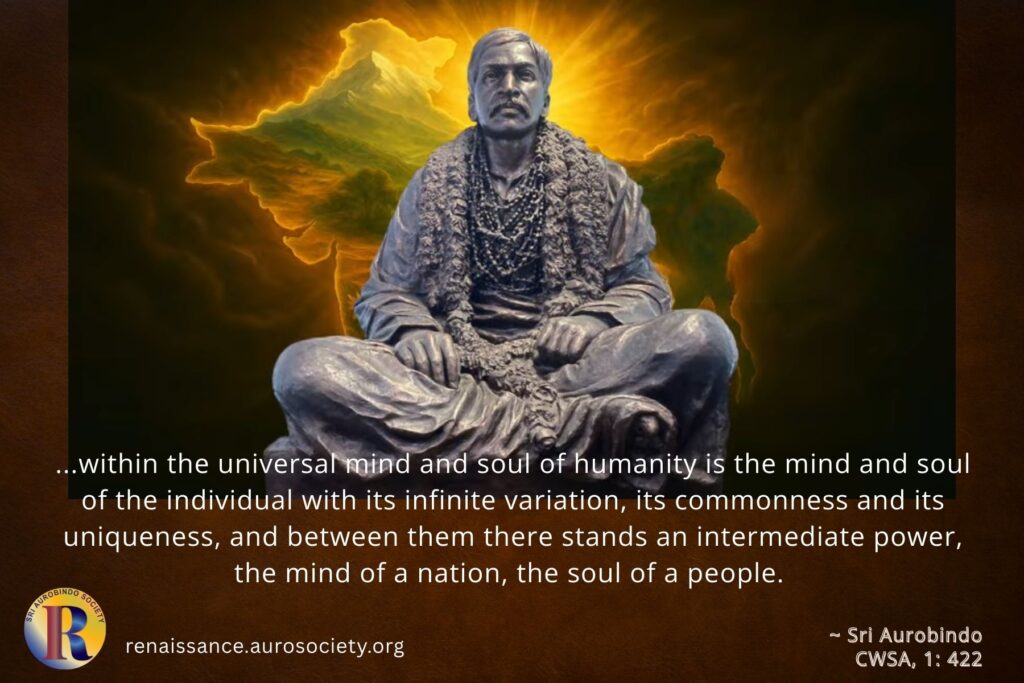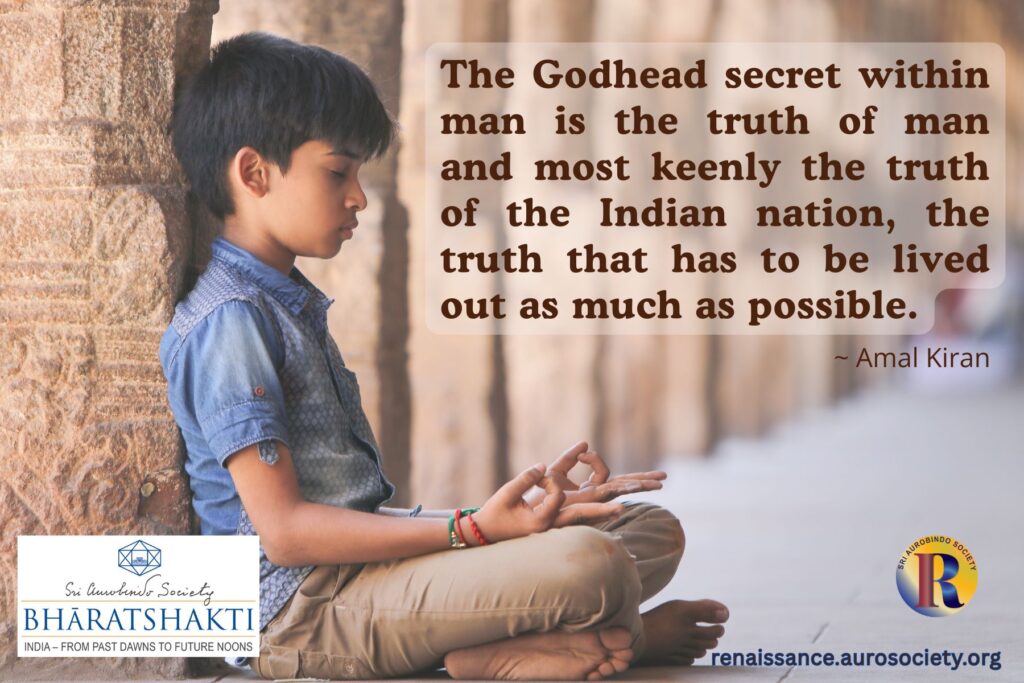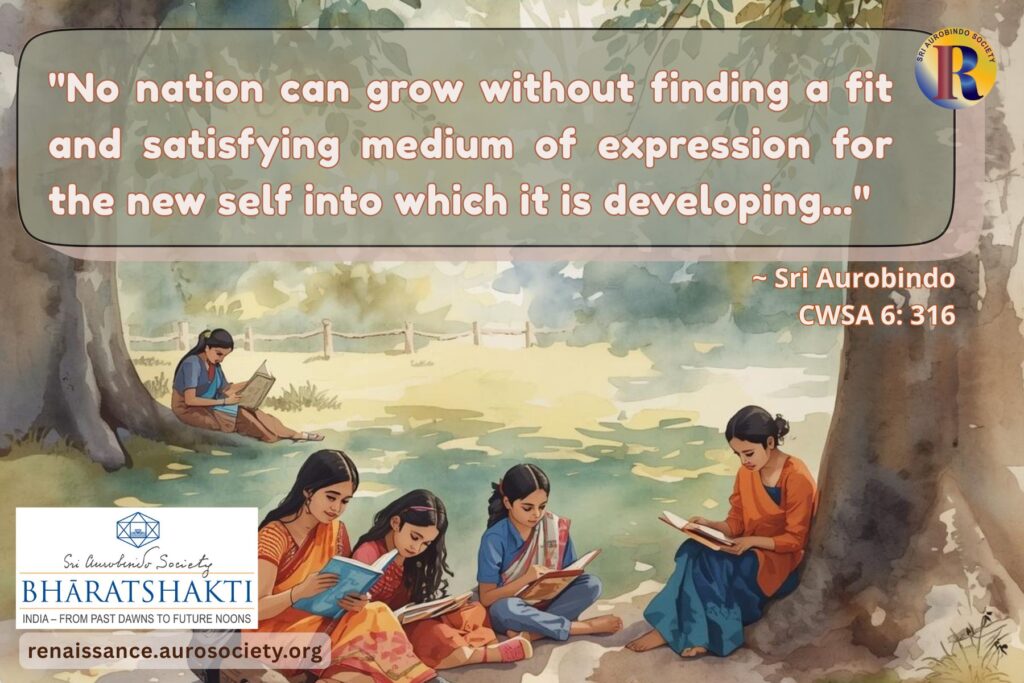Volume III, Issue 3
Author: Sri Aurobindo
Editor’s note: Featured here are excerpts from four writings of Sri Aurobindo from Bande Mataram, dated between 1908-1909. Only a few formatting changes are done by the editors for ease of online reading.
While all of Sri Aurobindo’s writings and speeches during his revolutionary days were fiery and awakened the people to take the path of courage and boldness in their work for India’s freedom, these passages are selected for their continued significance for today.
We live in times when the word ‘nationalism’ has somehow become questionable primarily because of West-centric limited and narrow meanings that have gotten attached to it. Like most of the political writings of Sri Aurobindo, these passages also speak of truths which are timeless, and hence remain relevant for our times.
Courage, he says is the first quality, absolutely essential if we truly wish to work for the glory of our motherland. No half-baked, wishy-washy patriotism; the Mother asks for sacrifice. Only a complete faith in the Divine who is leading the nation to her glorious future and a total freedom from fear will make us ready if we truly want to practice the religion of nationalism.
From our archives:
The Ideal of Indian Nationalism
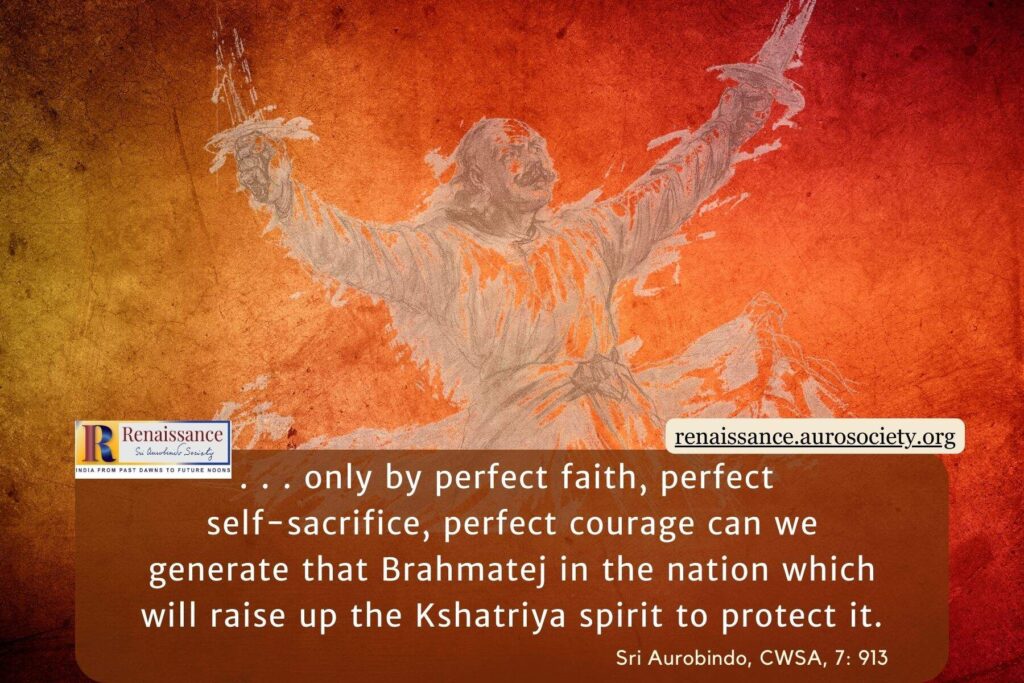
Nations do not prosper without self-sacrifice. None should turn back. . . from repaying his debt to the nation.
We do not want laziness, legerdemain or acting. Matured circumspection, limited and carefully adopted remedies will not do; one should rush forth. The self-respect of the nation is our religion, self-sacrifice is our only action or duty. We ought to give proper scope for the divine qualities in us to shine forth. Trifling emotions ought to be given up.
Do not be afraid even if you are required to die. Do not retreat; bear pain for the sake of the nation. God is your support. If you do this, the Indian nation will, in an instant, get back its former splendour and glory. It will take its place at the side of the independent nations of the world; it will educate other nations; it will shed the lustre of true knowledge, and it will inculcate the principles of Vedanta. Our nation will come forward to benefit the human race and the whole world. Before it the whole world will tremble! But when? Only when we all are prepared to repay our debt to the nation.
31 January 1908
~ CWSA, Vol. 7, p. 860
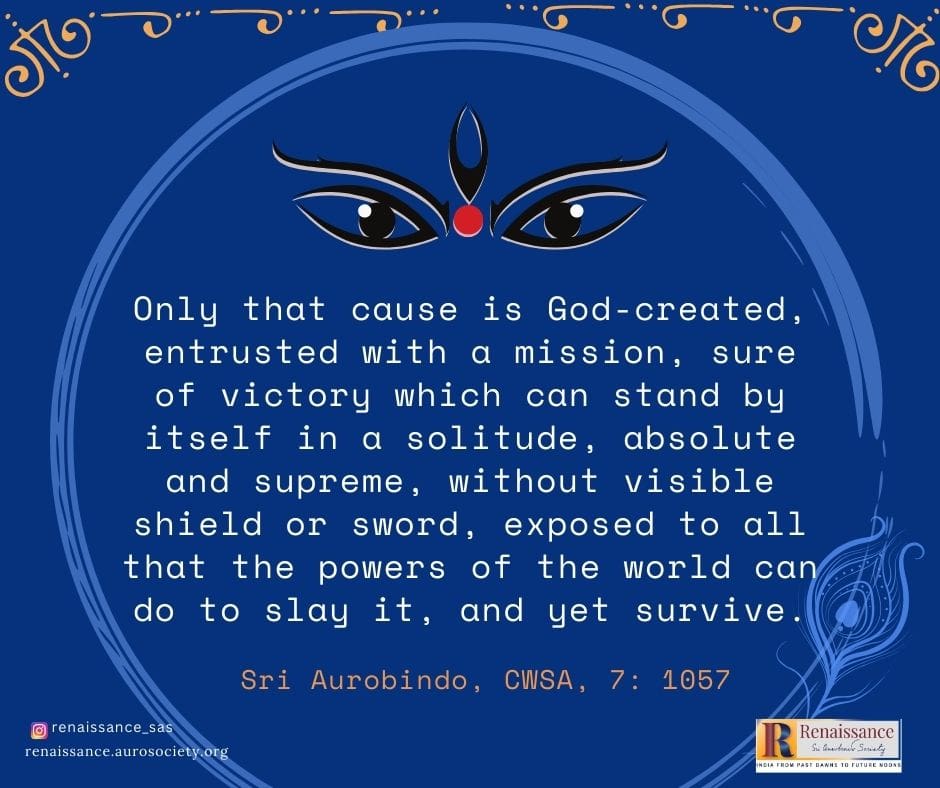
Only that cause is God-created, entrusted with a mission, sure of victory which can stand by itself in a solitude, absolute and supreme, without visible shield or sword, exposed to all that the powers of the world can do to slay it, and yet survive.
The powers of the world are the servants of God commissioned to test the purity of His workers, their faith, their courage, their self-devotion, His angels of destruction who put forth their whole strength to uproot the infant faith and scatter its followers, so that the wheat may be sifted from the chaff, the true believers from the half believers, and the new religion grow by suffering to its intended stature.
Every religion therefore has to begin with a period of persecution. The religion of Nationalism is already far on in this period. . .
So much chaff has been sifted from the wheat, so many stones have been rejected by the great Builder from His material for the house He is building for our Mother. As time goes on, the test will be fiercer, the sifting more violent and the heavier part of the chaff, if any remains, will follow the lighter. Only the heart that is free from fear, the spirit that is full of faith, the soul that is passionate for realization will remain for the final test and the last purification. . .
To all who have an emotional preference for the new ideas without a clear understanding of their supreme and urgent necessity, to all who understand the new ideas with their intellects only but have them not in their hearts, to all who, while loving and understanding the new ideas, have not faith to put aside the cloaks of prudence and dissimulation or courage to avow their faith openly before the world, the position is one of great perplexity.
God is a hard master and will not be served by halves.
All evasions, all subterfuges He cuts away and puts the question plain and loud; and before all mankind, before the friend ready to cut the ties of friendship asunder, before the enemy standing ready with lifted sword to slay the servants of God as soon as they confess their faith, it has to be answered: “Who is on the Lord’s side?”
Not once, not twice, but always that question is being put and the answer exacted. If you are unwilling to answer, either you do not believe that it is God’s work you are doing and are therefore unfit for it, or you have insufficient faith in His power to get His work done without the help of your diplomacy and cunning, or you are unwilling to meet any plain risks in His service.
To serve God under a cover is easy, to stipulate for safety in doing the work is natural to frail human nature, to sympathise and applaud is cheap; but the work demands sterner stuff in the men who will do it and insists on complete service, fearless service and honest service. The waverer must make up his mind either to answer God’s question or to give up the work.
From our archives:
The Life of Nationalism: When Sri Aurobindo Invoked Sri Krishna
There is plenty for him to do in a cheap, safe and easy way if he cannot face the risks of self-devotion. He can hold Conferences, enrol himself as a member of the Convention’s District Associations, open funds for national purposes, pass resolutions, sign petitions, hold patriotic interviews with Magistrates, Commissioners, Lieutenant-Governors, Governors and even perhaps with a live Viceroy; he can, if he is a barrister, plead in Swadeshi cases; he can take shares in profitable Swadeshi investments and boast himself a great Swadeshi worker, a captain of industry, a solid patriot; he can do real good to the country without peril to himself by subscribing to help National Education.
In these and other ways he can satisfy his secret proclivities for the service of his country. But the days when this easy service could pass for Nationalism are numbered.
The work now before us is of the sternest kind and requires men of an unflinching sternness to carry it out. The hero, the martyr, the man of iron will and iron heart, the grim fighter whose tough nerves defeat cannot tire out nor danger relax, the born leader in action, the man who cannot sleep or rest while his country is enslaved, the priest of Kali who can tear his heart out of his body and offer it as a bleeding sacrifice on the Mother’s altar, the heart of fire and the tongue of flame whose lightest word is an inspiration to self-sacrifice or a spur to action, for these the time is coming, the call will soon go forth. . .
Whoever feels the power of service within him, let him make sure of himself while there is yet time; for the present is an hour of easy probation, of light tests in which the punishment of failure is also light, but whoever fails in the day that be coming, will be thrown away not into the rubbish heap . . . into the fire of a great burning.
For all who now declare themselves Nationalists the tests will be far severer than that before which the place-hunter, the title-hunter, the popularity-hunter, the politician of mixed motives and crooked ways, the trimmer, the light speaker and ready swearer of the old politics have paled and recoiled so early and so easily.
The profession of Nationalism should not be lightly made but with a full sense of what it means and involves.
The privilege of taking it is attended with severe pains and penalties for those who take it lightly. If we are few, it matters little, but it is of supreme importance that the stuff of which we are made should be sound.
What the Mother needs is hard clear steel for her sword, hard massive granite for her fortress, wood that will not break for the handle of her bow, tough substance and true for the axle of her chariot. For the battle is near and the trumpet ready for the signal.
23 April 1908
~ Sri Aurobindo, CWSA, Vol. 7, pp. 1057-1060

We shall remember once more that the movement is a spiritual movement for prophets, martyrs and heroes to inspire, help and lead, not for diplomats and pinchbeck Machiavels; we shall realise that the spirit of India reawakened is the life of the movement and not a borrowed Western patriotism; we shall shrink once more from accommodation and paltering with the high call of our conscience as a fatal concession to the adversary and feel again that only by perfect faith, perfect self-sacrifice, perfect courage can we generate that Brahmatej in the nation which will raise up the Kshatriya spirit to protect it.
Without this Brahmatej, this spiritual force in our midst, all else will be vain; Swadeshi will cease, National Education fail, the great hopes and schemes now forming in our midst disappear like idle wreaths of smoke and the whole movement stain the pages of history as an abortive and premature impulse, a great chance of freedom lost because the body of the nation was not strong enough and the soul of the nation was not pure enough to sustain the tremendous inrush of spiritual force which had suddenly come upon it.
10 March 1908
~ Sri Aurobindo, CWSA, Vol. 7, p. 913
Also read:
Remembering Bagha Jatin
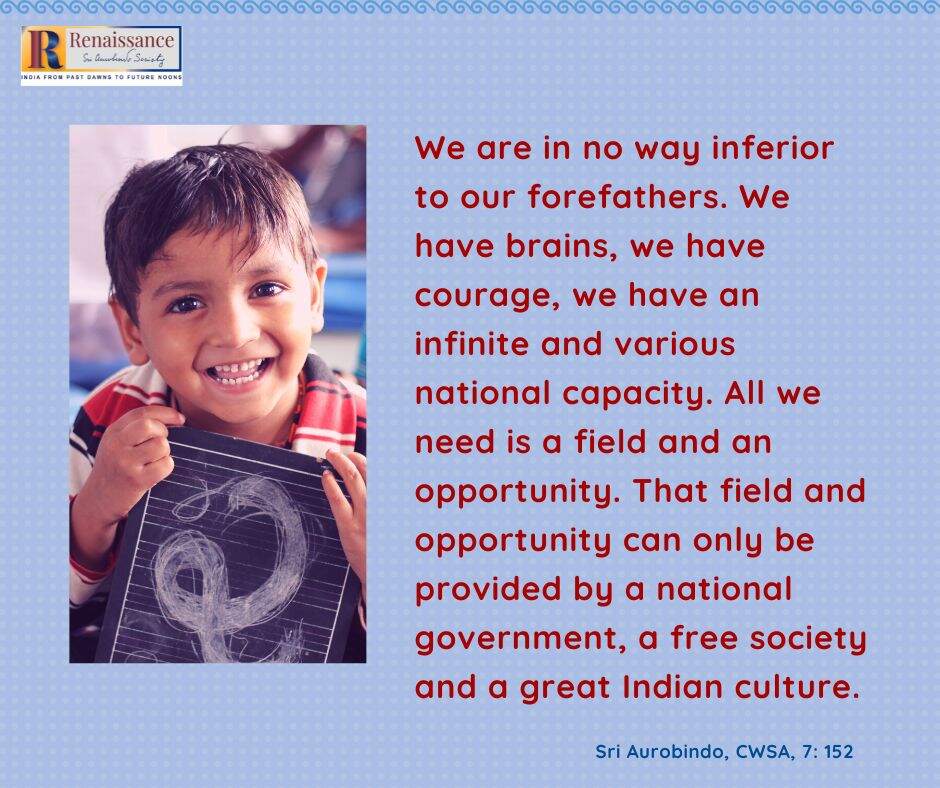
While admitting the stains and defects which long subjection has induced upon our native capacity and energy, we are conscious of that capacity and energy reviving in us. We point to the unexampled national vigour which has preserved the people of this country through centuries of calamity and defeat, to the great actions of our forefathers continued even to the other day, to the many men of intellect and character such as no other nation in a subject condition has been able to produce, and we say that a people capable of such unheard-of vitality is not one which can be put down as a nation of children and incapables.
We are in no way inferior to our forefathers. We have brains, we have courage, we have an infinite and various national capacity. All we need is a field and an opportunity. That field and opportunity can only be provided by a national government, a free society and a great Indian culture. So long as these are not conceded to us, we can have no other use for our brains, courage and capacity than to struggle unceasingly to achieve them.
31 July 1909
~ Sri Aurobindo, CWSA, Vol. 8, p. 152

~ Design: Beloo Mehra

